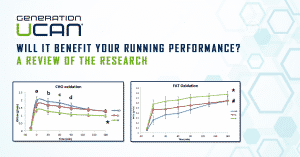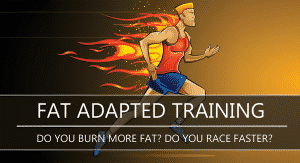 In 2014, Jeffrey Eggleston was the 3rd American at the Boston Marathon.
In 2014, Jeffrey Eggleston was the 3rd American at the Boston Marathon.
At the time, it was a big PR and one of Jeffrey’s best races to date (He also finished 13th at the World Championships in 2013).
Not to be outdone, Jeffrey traveled to Australia earlier in July to compete in the Gold Coast Marathon.
This time, he lowered his PR to 2:10:52, becoming one of the fastest American Marathoners this year.
In our continuing series on marathon nutrition, we asked Jeffrey to detail his training and pre-race diet for the marathon.
Finding an effective diet is an individualized journey because each person’s training and nutritional demands are different, such as variations in mileage, intensity, running experience and goals. Moreover, each runner’s body responds differently to foods.
For some, following Jeffrey’s diet would work great while others may have gastrointestinal problems or feel sick.
The goal here isn’t to provide something you should necessarily copy, but hopefully it helps you connect the theoretical to the practical and highlights some of the principles that will help you fine-tune your nutritional approach.

I hope this in-depth look helped you visualize how to structure your diet when training for the marathon.
For reference, Jeffrey runs about 120 miles per week on average and peaks at about 140 miles per week when training for the marathon. You can follow his blog and some of his training here.
Does this help you structure your nutrition plan?
Answer any burning questions?
Let us know in the comments section, we’d love to help.





15 Responses
How is this a vegan diet? It includes fish and meat!
Confused!
Is that the right image for the ? If it is then Jeffrey has an interesting take on veganism!
Interesting, though I think you may have mixed up your diets there, since Vegan’s generally don’t eat Salmon or Chicken?
In what way is that menu vegan??
Apologies for the confusion with this article and diet. Jeffrey used to be vegan and I didn’t check the diet – I just assumed. You know what they say about assuming.
Perhaps the most interesting thing about this article (thanks by the way) is that if you add up the total calories per day, then consider how much running/training the guy does, is that it’s really NOT A LOT! He’s more likely to be expending more energy than he’s taking in which is why distance runners can maintain such an effectively thin build.
So it looks like ~2400-2500 calories on most days with ~3100 on race/heavy workout days.
What is Jeffrey’s height, weight, BMI, body fat %? How does his caloric intake and % of carb/protein/fat compare with what your calorie calculator recommends?
What is your RD’s assessment of his diet?(I mean, obviously it’s working for him, but could she suggest any tweaks/improvements or adjustments for us regular folks?
Notably absent: most processed/packaged foods and sugar (except for fruit, what’s in the granola and sports nutrition products).
I can’t imagine eating 2 bagels and nut butter before running!
Glad he’s doing so well, look forward to his becoming a “2:07” guy.
I’m assuming he fuels *during* a lot of his training runs as well, which might mitigate some of the pre- and post-run fueling that’s not seen. Really, this volume of food for a 120-mpw guy is insufficient. His recovery would suffer greatly and his metabolism would slow over the years from this constant caloric deficit.
I don’t understand why he is so afraid of fat since he seems to avoid that in every way. And using bars, gels and bananas on his normal workouts sounds like he is not giving his body a chance to learn to use fat, which is much more efficient than carbs. I have good experience doing long runs fasted and to use effective energy resources like saturated fat, coconut oil, butter, cream. But this guy is fast and I am not but I never hit the wall running on fat. A lot of interesting articles here but I don’t see why a runner should avoid fat. Sugar is really the enemy.
Are you a 2:10 marathoner?
I don’t think so.
Take a look at the diet of Kenyans and notice how little fat they consume. I’m merely pointing out that you are not qualified to promote a high-fat diet since I know who Eggleston is but I have no idea who you are…..
Race results are not qualifications for having an opinion, either educated or otherwise. If it were, the vast, vast majority of exercise physiologists and nutrition experts from which our typical qualified advice comes would be invalid. That said, the high fat mantra that is spewed by many in the crossfit, paleo, and ultra community as of late is utter rubbish for things that are done at even moderate intensity. Becoming better at utilizing fat also means you are becoming worse at utilizing carbohydrates, which are the preferred fuel source at the speed a 2:10 marathoner is running. Further, I guarantee anyone with the aerobic base to run a 2:10 marathon is already phenomenally fat adapted. This diet is nowhere near perfect but not for the reasons asle claims.
There’s no way he gets by on 120-140 miles a week with only 2400 calories on a typical training day… I only run 50-60 mpw and eat about 3000 a day, and I’m 5’4 110 lbs with extremely low body fat levels.
Wow! thanks for the insight. The must be something about caffeine. The must be something. Banana I also trust them, will start using them more frequently. This goes to say that you have to be serious about @ training first. Thanks Guys.
Thanks for reaching out. Glad you found the article helpful. We actually have a post on caffeine if you are interested in that https://runnersconnect.net/running-nutrition-articles/caffeine-and-running/
I can’t believe you can run 18 miles per day (on average) with 2500 kcal. This amount of workout (I’m not even counting any strength training etc) would consume easily 1500kcal. Then you have only 1000kcal basal consumption?